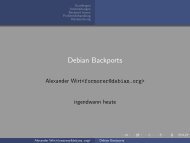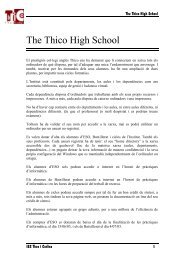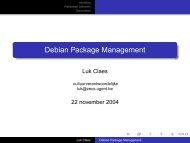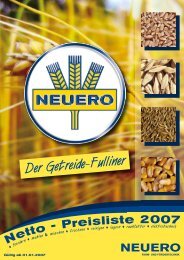Free Software In Biology Using Debian-Med: A Resource For ...
Free Software In Biology Using Debian-Med: A Resource For ...
Free Software In Biology Using Debian-Med: A Resource For ...
Create successful ePaper yourself
Turn your PDF publications into a flip-book with our unique Google optimized e-Paper software.
From the perspective of data security for Grids or Agent Environments,<br />
it should be stressed that <strong>Debian</strong> GNU/Linux has the unique<br />
feature of the automated creation of chroot environments. <strong>In</strong> a<br />
dedicated directory, the minimal set of programs is stored to run<br />
a a <strong>Debian</strong> GNU/Linux system. A process started in such will not<br />
have file access to the remainder of the system with otherwise complete<br />
functionality. The process is separated, even when started as<br />
root. Hence, arbitrary packages can be added and computations<br />
performed, be it for the build daemon, for the grid or for agent environment,<br />
without accidentally or intentionally impeding the functioning<br />
of the underlying operating system.<br />
The concept of integrating common tools in Bioinformatics to form<br />
a grid is recently exploited in the Lattice project in the group of<br />
Michael Cummings [19]. It is based on the libraries of the BOINC<br />
platform [5], the successor technology of the internet-distributed<br />
search for extraterrestrial intelligence from Berkeley, for which libraries<br />
for <strong>Debian</strong> exist.<br />
4.1 Differences from other distributions<br />
The <strong>Debian</strong> GNU/Linux distribution differs from others in several<br />
ways. Firstly, <strong>Debian</strong> is a non-commercial organisation of volunteers,<br />
that does not sell anything. The second and most appealing<br />
difference is the peer review and continuous pressure among the<br />
members to provide a high quality of packages. The <strong>Debian</strong> society<br />
has a constitution, elects its leader, and transparently describes<br />
policies for the creation of packages utilising specific technologies.<br />
With these principles, <strong>Debian</strong> achieved the largest collection of<br />
ready-to-install <strong>Free</strong> <strong>Software</strong> on the <strong>In</strong>ternet.<br />
4.2 Remaining issues<br />
Programs not submitted to the main <strong>Debian</strong> distribution, i.e. for<br />
the size of the binary, because of being of interest only to a very<br />
small user base or because of license restrictions, will require to be<br />
maintained externally. A Grid’s VO might decide to create such a<br />
shared repository also for an improved accessibility of a repository<br />
for non-debian in-house developers, hereby improving the communication<br />
with the Grid’s user base and its developers.<br />
4.2.1 Licensing issues<br />
Several existing programs that might be useful for specialists are<br />
not free in the sense of the <strong>Debian</strong> <strong>Free</strong> <strong>Software</strong> Guidelines [20].<br />
Programs that are incompatible with the DFSG cannot be included<br />
in the <strong>Debian</strong> main distribution. One famous example of this group<br />
is PhyLip and the same hold for ClustalW. Both programs’ licenses<br />
contain a clause like<br />
Permission is granted to copy and use this program<br />
provided no fee is charged for it and provided that this<br />
copyright notice is not removed.<br />
As a consequence no reseller of <strong>Debian</strong> would be allowed to sell<br />
<strong>Debian</strong> because one CD contains PhyLip. Hence, this program may<br />
not be redistributed per default with the main and essential tools of<br />
<strong>Debian</strong>. Problems are, starting with those for the user:<br />
• Need to obtain PhyLip from a different source<br />
• If the user is not using a "common" architecture like i386<br />
he might run into problems in compiling the latest version as<br />
only the packages of the main distribution are submitted to<br />
the build daemons to save resources.<br />
• The user might not even notice that something like PhyLip<br />
exists at all. <strong>Debian</strong>-<strong>Med</strong> cares for pointing users to relevant<br />
software and thus the user will be pointed to each single program<br />
package inside <strong>Debian</strong> which of interest for biological<br />
research.<br />
From the developers point of view we face also drawbacks:<br />
• Possibly smaller user base (see last point above)<br />
• Fewer bug reports and thus lower chance to increase the quality<br />
of their software.<br />
• Porting problems to different architectures might not be revealed<br />
early.<br />
While every author is perfectly free to choose this kind of license,<br />
<strong>Free</strong> <strong>Software</strong> experts agree that this kind of restrictions is possibly<br />
a drawback for those programs because they do not fully use the<br />
spinning power of <strong>Free</strong> <strong>Software</strong> development.<br />
4.2.2 Importance of community support<br />
That strong support within the community of users is essential for<br />
the development of software, for quality assurance, feedback on<br />
features, and not at least for the motivation of staff, all commercial<br />
distributors are well aware of. E.g., RedHat has initiated Fedora as<br />
a free supplement to their commercial distribution. It is this reason<br />
why <strong>Debian</strong>-<strong>Med</strong> is part of <strong>Debian</strong> and why groups external to the<br />
<strong>Debian</strong> society, like BioLinux, are also keen on close collaborations<br />
with the community.<br />
4.2.3 Road map to come closer to <strong>Debian</strong>-<strong>Med</strong><br />
1. Join the <strong>Debian</strong>-<strong>Med</strong> mailing list.<br />
2. Check what projects are missing and ask <strong>Debian</strong> maintainers<br />
for official inclusion. There is a sponsoring program<br />
by which even non <strong>Debian</strong> developers can provide packages<br />
which are checked and uploaded by official maintainers.<br />
There is no point in keeping good quality softwares outside<br />
of <strong>Debian</strong>.<br />
3. Verify whether one needs special configuration for your<br />
project. If yes, verify which possibilities are given in the<br />
Custom <strong>Debian</strong> Distribution effort. It is more than collecting<br />
software but bringing the software to your target users<br />
while taking the burden from any configuration issues from<br />
his back.<br />
4. The only reason to keep things outside of <strong>Debian</strong> are licenses<br />
which are not compatible with DFSG. All other parts of your<br />
projects can be included and your time for everyday package<br />
building tasks can be saved and the workload shared with<br />
other people following the same road.<br />
There are two ways to obtain <strong>Debian</strong> GNU/Linux:<br />
1. <strong>In</strong>stallation from a CD that may be borrowed from a friend,<br />
or bought from a commercial vendor. This may be together<br />
with a computer magazine on a newsstand or from a redistributor<br />
on the <strong>In</strong>ternet.






